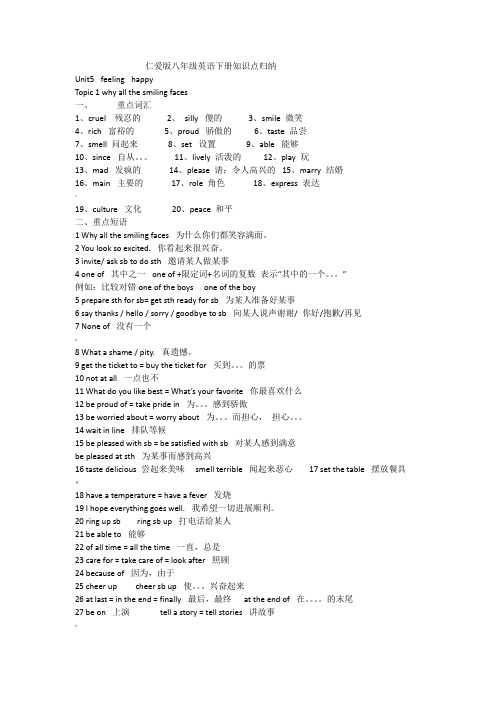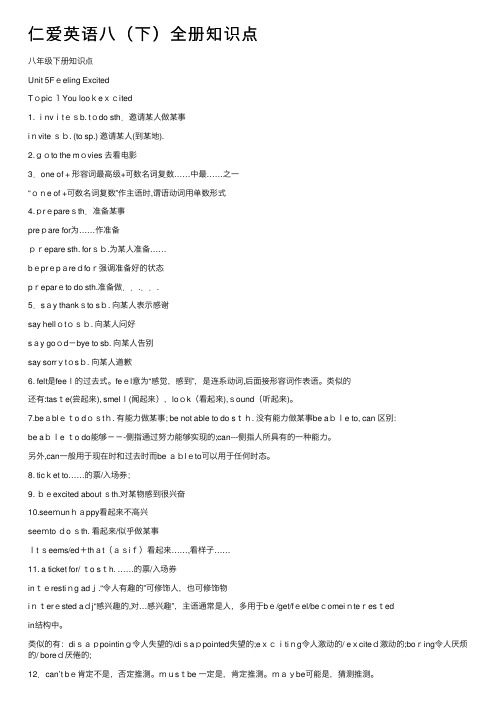仁爱英语八年级下知识点总结
仁爱英语八年级下各单元短语归纳完整版

仁爱英语八年级下各单元短语归纳集团标准化办公室:[VV986T-J682P28-JP266L8-68PNN]Unit5TopicOne1.lookexcited看起来兴奋,激动2.feelhappy/disappointed感到高兴/失望3.tastedelicious/good尝起来美味4.soundwonderful/sweet/great听起来精彩/甜美/好,不错5.smellterrible闻起来恶心6.gomad/bad发疯/变坏7.turngreen/yellow变成绿色/黄色8.bepopularwithsb.受某人欢迎9.seem(tobe)unhappy似乎不高兴10.seemtodosth.似乎做,好像做11.gotothemovies=gotoseethemovie去看电影12.invite/asksbtodosth邀请某人做某事13.invitesb.to+sp.邀请某人去/参加…14.oneof+最高级+pl.最…之一15.preparesthforsb=preparesb.sth.为某人准备好某事16.preparetodosth.准备做17.saythanks/hello/sorry/goodbyetosb向某人说声谢谢/你好/抱歉/再见18.Whatashame/pity.真遗憾。
19.get/buytheticketto/for买到…的票20.beabletodo=can/coulddo能够做…21.willbeabletodo将会做…22.onthe/one’sway to在去往…的路上23.onthewayhome/here/there在回家/去这儿/那儿的路上24.rightnow/away=atonce立即,马上25.feel/besorryfor(doing)sth为(做)某事感到抱歉/遗憾/难过26.beangrywithsb.对某人生气27.justnow=amomentago刚才(用于过去时)28.carefor=takecareof=lookafter照顾29.becauseof+n.因为…,由于…30.because+句子因为…,由于…31.cheersbup=makesb.Happy使…兴奋起来32.atlast=intheend=finally最后,最终33.attheendof…在…的末尾/尽头34.atfirst起初,开始smilingfaces笑脸35.noisychildren吵闹的孩子们36.lovelysongs活泼的歌曲37.livealone独居be/feellonely感到孤独38.teachsb.todosth.教某人做39.teachoneselfsth.=learnsth.byoneself自学…eintobeing=beborn出现,形成41.fallinto落入,掉入lookfor寻找42.everywhere=hereandthere到处43.bewithahistoryof200years=haveahistoryof200years=have200 yearsofhistory有着两百年的历史eintobeing=beborn形成efrom=befrom来自46.moreandmore+n./原级越来越来…47.be/becomeinterestedin(doing)sth.对…感兴趣48.makepeacewithsb与某人和解49.findawaytodo/ofdoingsth.找到做…的方法50.Itseems/seemedthat+句子。
仁爱版八年级英语下册知识点归纳

仁爱版八年级英语下册知识点归纳Unit5 feeling happyTopic 1 why all the smiling faces一、重点词汇1、cruel 残忍的2、silly 傻的3、smile 微笑4、rich 富裕的5、proud 骄傲的6、taste 品尝7、smell 问起来8、set 设置9、able 能够10、since 自从。
11、lively 活泼的12、play 玩13、mad 发疯的14、please 请;令人高兴的15、marry 结婚16、main 主要的17、role 角色18、express 表达~19、culture 文化20、peace 和平二、重点短语1 Why all the smiling faces 为什么你们都笑容满面。
2 You look so excited. 你看起来很兴奋。
3 invite/ ask sb to do sth 邀请某人做某事4 one of 其中之一one of +限定词+名词的复数表示“其中的一个。
”例如:比较对错one of the boys one of the boy5 prepare sth for sb= get sth ready for sb 为某人准备好某事6 say thanks / hello / sorry / goodbye to sb 向某人说声谢谢/ 你好/抱歉/再见7 None of 没有一个<8 What a shame / pity. 真遗憾。
9 get the ticket to = buy the ticket for 买到。
的票10 not at all 一点也不11 What do you like best = What’s your favorite你最喜欢什么12 be proud of = take pride in 为。
感到骄傲13 be worried about = worry about 为。
八年级下册仁爱英语知识点

八年级下册仁爱英语知识点八年级下册仁爱英语知识点大全go out for dinner 出去吃饭stay out late 在外面待到很晚go to the movies 去看电影get a ride 搭车work on 从事finish doing sth. 完成做某事clean and tid y 干净整洁do the dishes 洗餐具take out the rubbish 倒垃圾fold your/the clothes 叠衣服sweep the floor 扫地make your/the bed 整理床铺clean the livng room 打扫客厅no problem 没问题welcome sb. 欢迎某人come home fro m school/ work放学/下班回家throw down 扔下sit down 坐下come over 过来take sb. for a walk 带某人去散步all the time 一直;总是all day/evening 整曰/夜do housew ork 做家务shout back 大声回应walk away 走开.share the housework 分担家务a com fortable home 一个舒适的家in surprise 惊讶地get som ething to drin k 拿点喝的东西watch one show 观看一个节目hang out 闲逛pass sb. sth. 把某物传给某人lend sb. sth. 把某物借给某人get sth. wet 使某物弄湿hate to do sth. 讨厌做某事do chores 做杂务help sb. (to ) d o /with sth帮助某人干某事bring a tent带顶帐篷来buy some snacks买些小吃go to the store去商店invite sb. to a party邀请某人参加聚会make sb. do sth. 使某人做某事enough stress足够的压力awaste of tim e浪费时间in order to为了get good grades取得好成绩m ind doing sth. 介意做某事depend on依赖;依靠develop c h ild re n ’ s independence发展孩子的独立性look after/take care of 照顾;照看do one’ s part in (doin g ) sth.做某人分内的事八年级英语Unit3单元知识点:重点句型1. Could you please…..do sth. ?Could you please clean your room?你能整理一下你的房间吗?2. I have to do some work.我必须干些活。
八下英语仁爱版知识点总结

八下英语仁爱版知识点总结Unit 1: Getting to Know Each Other.Greetings and Introductions: Hello, goodbye, nice to meet you, my name is..., what's your name?, where are you from?, I'm from..., how are you?, I'm fine, thank you.Personal Information: name, age, birthday, address, phone number, email address, nationality, favorite color, favorite food, favorite subject, hobbies.Making Friends: asking questions to get to know someone, finding common interests, being friendly and approachable.Unit 2: My Family and Friends.Family Members: father, mother, brother, sister, grandparents, aunts, uncles, cousins.Describing Family Members: age, appearance, personality,occupation, hobbies.Friends: best friends, close friends, classmates, neighbors, online friends.Describing Friends: appearance, personality, interests, how you met them.Unit 3: My School Life.School Subjects: English, math, science, history, geography, music, art, physical education.School Activities: attending classes, taking notes, doing homework, studying for tests, participating in extracurricular activities.School Rules and Regulations: uniforms, attendance, behavior, discipline.School Events: school trips, sports events, cultural performances, graduation ceremonies.Unit 4: Where I Live.Types of Houses: houses, apartments, villas, bungalows, mansions.Parts of a House: living room, kitchen, bedroom, bathroom, garden.Describing a House: size, location, number of rooms, amenities, appearance.Neighborhood: neighbors, local businesses, parks, schools, hospitals.Unit 5: Daily Life.Daily Routine: waking up, getting dressed, eating breakfast, going to school, doing homework, playing, watching TV, going to bed.Food and Drinks: breakfast, lunch, dinner, snacks,fruits, vegetables, meat, fish, drinks.Clothing: types of clothes, colors, patterns, sizes, styles.Unit 6: My Town or City.Landmarks: famous buildings, monuments, statues, bridges.Public Places: parks, squares, museums, libraries, shopping malls, hospitals.Transportation: buses, trains, cars, taxis, bicycles.People and Culture: local customs, traditions, festivals, food.Unit 7: Travel and Adventure.Travel Destinations: countries, cities, tourist attractions.Travel Activities: sightseeing, shopping, dining, hiking, swimming.Transportation: planes, trains, buses, cars.Travel Tips: packing, getting around, staying safe.Unit 8: The Natural World.Animals: mammals, birds, fish, reptiles, amphibians.Plants: flowers, trees, shrubs, fruits, vegetables.Natural Resources: water, forests, minerals, oil, gas.Environmental Issues: pollution, climate change, deforestation.Unit 9: Science and Technology.Inventions: telephone, computer, microscope, television,airplane.Scientists: Albert Einstein, Marie Curie, Isaac Newton, Charles Darwin.Scientific Experiments: conducting experiments, collecting data, analyzing results.Technological Advancements: smart phones, laptops, tablets, artificial intelligence.Unit 10: The World Around Us.Countries of the World: continents, countries, capitals.Cultures of the World: languages, religions, traditions, customs.Global Issues: poverty, hunger, war, climate change.International Cooperation: United Nations, Red Cross, Doctors Without Borders.。
仁爱英语八(下)全册知识点

仁爱英语⼋(下)全册知识点⼋年级下册知识点Unit 5Feeling ExcitedTopic 1You lookexcited1. invitesb. todo sth.邀请某⼈做某事invite sb. (to sp.) 邀请某⼈(到某地).2.goto the movies 去看电影3.one of + 形容词最⾼级+可数名词复数……中最……之⼀“one of +可数名词复数”作主语时,谓语动词⽤单数形式4.preparesth.准备某事prepare for为……作准备prepare sth. forsb.为某⼈准备……bepreparedfor强调准备好的状态prepareto do sth.准备做......5.say thanksto sb. 向某⼈表⽰感谢say hellotosb. 向某⼈问好say good-bye to sb. 向某⼈告别say sorrytosb. 向某⼈道歉6. felt是feel的过去式。
feel意为“感觉,感到”,是连系动词,后⾯接形容词作表语。
类似的还有:taste(尝起来), smell(闻起来),look(看起来),sound(听起来)。
7.beableto dosth. 有能⼒做某事; be not able to do sth. 没有能⼒做某事be able to, can 区别:be able to do能够---侧指通过努⼒能够实现的;can---侧指⼈所具有的⼀种能⼒。
另外,can⼀般⽤于现在时和过去时⽽be ableto可以⽤于任何时态。
8. ticket to……的票/⼊场券;9. beexcited about sth.对某物感到很兴奋10.seemunhappy看起来不⾼兴seemto do sth. 看起来/似乎做某事It seems/ed+that(asif)看起来……,看样⼦……11. a ticket for/ to sth. ……的票/⼊场券interesting adj.“令⼈有趣的”可修饰⼈,也可修饰物interested adj“感兴趣的,对…感兴趣”,主语通常是⼈,多⽤于be/get/feel/becomeinterestedin结构中。
八年级下册仁爱版英语知识点总结

八年级下册仁爱版英语知识点总结对知识的渴求是人类的自然意向,任何头脑健全的人都会为获取知识而不惜一切,下面小编给大家分享一些八年级下册仁爱版英语知识,希望能够帮助大家,欢迎阅读!八年级下册仁爱版英语知识1【重点短语】1.be busy doing sth 忙于做某事be busy with sth. 忙于某事2.on vacation度假3.work out 算出,制定,完成4.in the center of 在……中央5.can’t wait to do sth 迫不及待做某事can’t help doing sth 情不自禁做某事6.one and a half hours= one hour and a half一个半小时7.be surprised at sth. 对某事感到惊奇be surprised to do sth. 惊奇于做某事8.in all directions四面八方9.a parking lot 一个停车场10. push one’s way out从人群中挤出来11.at last =in the end =finally最后,终于12.be famous for 因为……而著名be famous as 作为……而著名13.have fun (in) doing sth. 从做某事中获得乐趣14.thank goodness 谢天谢地15.as soon as 一……就……16.be full of…满的,充满的17.make a plan 制定一个计划18.lie in 位于……内(指某一范围之内)lie on 与……紧挨着(接壤,不管辖)lie to 隔……相望(不接壤,不管辖)19.be/get lost 迷路20.take out 拿出21.step on 踩,踏22.ten meters long/wide/high十米长/宽/高【词形转换】1.north n.北,北方northern adj.北方的,北部的2.mean v.意味着meaning n.意义,含义meaningful adj.重要的,重大的,意味深长的3.crowd n.[C]人群v.拥挤crowded adj.拥挤的4.experience v.经历n.经历[C];经验[U]experienced adj.有经验的【重点句型】1.Would you like to come to China for your vacation?你愿意来中国度假吗?2.I can’t wait to see it.我迫不及待想看它了。
仁爱八年级下英语知识点

仁爱八年级下英语知识点英语作为国际通用语言,对于现代人的职业发展和日常交流都极其重要。
在仁爱八年级下,我们将从听说读写四个方面,全面学习英语知识点。
语法知识1. 直述句(陈述句)主语+谓语+宾语例句:She loves ice cream.2. 疑问句(一般疑问句)助动词+主语+谓语+宾语例句:Do you like pizza?3. 祈使句(命令句)动词原形+宾语例句:Clean your room.4. 句子成分(主语、谓语、宾语、定语、状语等)例句:The boy with glasses is my friend.口语表达1. 自我介绍例句:Hello, my name is Jack. I am from Shanghai.2. 意见交流例句:What do you think of this movie?3. 问路例句:Excuse me, where is the nearest bank?4. 约会例句:Would you like to have dinner with me tonight?听力训练1. 美国口音和英国口音的区别2. 不同场景下的英语口语表达3. 对话中正确听取数字、时间等4. 听取简单的新闻或者广播等阅读理解1. 阅读基础知识(字母、数字、大小写)2. 阅读简单的短文,了解文章基本内容3. 阅读故事和小说,理解情节和人物关系4. 阅读新闻等实用文章,了解时事信息写作能力1. 自我介绍2. 写日记、周记、月记等3. 写作文,例如:写一篇关于影响健康的因素的文章4. 写简历,求职信等总结仁爱八年级下英语知识点包含了很多方面,包括语法、口语、听力、阅读和写作等,我们需要在日常学习中逐步积累和运用这些知识点。
只有通过反复的练习和实践,我们才能真正掌握英语知识,使其成为我们通往更广阔世界的一把钥匙。
仁爱英语八年级下册unit8知识点

仁爱英语八年级下册unit8知识点八年级下册unit8知识点详解Unit8是仁爱英语八年级下册的重要单元,本单元主要涉及到其它单元所学的语言技能,如听、说、读、写等。
它对学生的英语水平提高有非常重要的作用。
下面我们来详细讲解Unit8的知识点,希望能够对大家有所帮助。
一、单词及短语1. direction (n.) 方向2. turn left/right 向左/右转3. block (n.) 街区4. go straight (to…) 直走(到…)5. cross (v.) 穿过;过马路6. traffic light (n.) 交通灯7. on the corner 在街角8. opposite (prep.) 在……的对面9. next to 在……旁边10. between…and… 在……和……之间二、用法注意1.方向:大多数情况下,我们使用“turn left / right”来表示向左或右转,但有时也需要用其他动词,如“go/be on the left/right”。
2.过马路:当我们要表示在马路上横穿马路时,必须要用“cross”,不能直接使用“go”。
3.描述位置:我们可以使用“opposite”、“next to”、“between…and…”等词语来描述位置关系,但注意,这些词语只能用于描述两个对象之间,不能用来描述三个或以上的对象之间的位置关系。
4.描述路线:描述路线时,应该使用明确的指示物表示路径,如街角、交通灯、公交站等,避免使用不具体的词语,如“向北走”、“向右拐”之类。
三、语言运用1.如何给路人指路:当我们被人问路时,我们要先问对方的目的地和起点,然后给出清晰的指示,最后对方确认无误后,方可离去。
例如:A: Excuse me, can you tell me how to get to the nearest bank?B: Sure, where are you now?A: I’m at the intersection of Center Street and Park Avenue.B: OK, walk straight ahead along Park Avenue for one block, thent urn right at the traffic light. You’ll see the bank on your right.A: Thank you very much. Have a nice day!2.如何在陌生的城市出行:当我们在陌生的城市内旅行时,我们需要先规划好路线,了解目的地所在的位置和旅行的交通方式。
- 1、下载文档前请自行甄别文档内容的完整性,平台不提供额外的编辑、内容补充、找答案等附加服务。
- 2、"仅部分预览"的文档,不可在线预览部分如存在完整性等问题,可反馈申请退款(可完整预览的文档不适用该条件!)。
- 3、如文档侵犯您的权益,请联系客服反馈,我们会尽快为您处理(人工客服工作时间:9:00-18:30)。
仁爱英语八年级下知识点总结Revised by Chen Zhen in 2021仁爱英语八年级下知识点总结Unit 5 Feeling HappyTopic 1 Why all the smiling faces?一. 重点词汇:(一)反义词happy----unhappy/ sad lucky----unlucky poor----rich kind----cruel popular----unpopular smart----stupid/ silly interesting----boring (二)表示情感的形容词excited感到兴奋的 surprised 吃惊的 happy 快乐的unhappy/ sad 伤心的 angry / mad 生气的 worried 焦急的afraid/ frightened 害怕的 disappointed 失望的 proud 自豪的lonely 孤单的 nervous 紧张不安的 interested 感到有趣的(三)重点词组1. one of my favorite movies 我最喜欢的电影之一2. spend the evening 过夜3. say thanks / goodbye/ hello to sb. 向某人道谢/道别/问好4. tell a short story 讲一个小故事5. a ticket to…一张…的票6. wish to do sth. 希望做某事7. get enough sleep 得到足够的睡眠8. win a medal 获得一枚奖牌9. feel proud/ lonely 感到自豪/孤单10. set a table for…为……摆餐具11. have a temperature = have a fever 发烧12. be able to do sth. 有能力做某事13. ring up 给……打电话14. care for= look after/ take care of 照顾15. because of 由于16. cheer up / cheer on 使……振奋、高兴起来 / 为……喝彩、加油17. play the role of sb. 扮演某人的角色18. be on 上演; 放映19. at first 首先20. fall into 落入21. be afraid of doing sth. 害怕做某事22. in/at the end = at last 最后23. go mad 发疯24. come into being 形成25. be full of 充满…26. be popular with…受……喜爱27. make peace 制造和平28. end/begin with…以……结尾/开始二. 重点句型及重点语言点1. How nice! 真是太好了!What a shame! 真可惜! =That’s too bad!What bad news! 多糟的消息!这三句全都是感叹句.它们的结构为:1) How + adj./ adv. + 主语 + 谓语! 如: How moving the movie is! How fast the boy runs!2) What + a/an + adj. + n. (可数名词的单数) + 主语 + 谓语! 如: What a big apple (it is)!3) What + adj. + n.(可数名词的复数或不可数名词) + 主语 + 谓语! 如:What interesting stories (they are)! What hard work( it is)!2. Because he can’t get a ticket to The Sound of Music. 因为他没有买到《音乐之声》的票.to 表“的”,常见的搭配如下:a ticket toThe Sound of Music 一张《音乐之声》的票the answer to the question 问题的答案the key to the door 门的钥匙the way to…去…..的路3. I think Mr. Lee likes it very much and really wishes to watch it. 我认为李老师非常喜欢它而且的确想去看. wish/ hope to do sth.希望做某事与 wish 相关的结构还有: wish/ hope + that引导的从句; 如:I wish/ hope (that) we will win.我们可以说wish sb. to do sth. 而不能说hope sb. to do sth.;4. I’ll ring up Michael later. 稍后我打电话给迈克.ring up sb. = call/ ring/ phone sb. = give sb. a ring/ call/ telephone = make a telephone to sb.当宾语为代词时, 只能放中间.如: ring me/him/her up5.…since they were not able to go. ……既然他们不能去.can与be able to 二者都表“能;会”,在指“一般能力”时,常互换。
如:He can/is able to work out the problem. 他能算出这道难题.区别: can 只有现在式和过去式(could),没有数的变化;而be able to 有时态及数的变化. 如: I/ She couldn’t swim three years ago, but now I / She can .三年前,我/她不会游泳, 但现在我/她能.I will be able to see him next week. 下周, 我将会看到他.They were /He was able to climb the mountain, but now they aren’t/ He wasn’t.They’re / He was too old. 他们/他过去能爬得上这座山, 但现在不能. 他们/他太老了.6. I’m sure Mr. Lee will be surprised and happy! 我确信李老师会很惊奇也很高兴! be surprised “感到惊奇的”, 主语一般为人.be surprising “令人惊奇的”, 主语一般为物.类似的有:interested/ interesting; excited/ exciting; bored/ boring7. The lonely father often became angry because of the noisy children. 孤独的父亲经常由于吵吵闹闹的的孩子们而发怒了。
because of “由于”,是介词短语,后常跟名词或短语。
如:He didn’t come to school because of his illness./ because he was ill.由于他的病,他没来上学。
We didn’t go there because of the heavy rain./ because it rained heavily.由于大雨,我们没去那儿。
8. Maria was able to cheer up the family by teaching them to sing lively songs…玛丽亚有能力通过教他们唱轻快的歌曲使整个家庭振作起来。
by 是介词,指“通过(某种方式)”,后面跟名词、代词、形容词或动名词。
9. What did Maria go to the Von Trapp family for = Why did Maria go to the Von Trapp玛丽亚为了什么目的去冯特拉普家庭?10. … and the mother was so worried that she looked for him everywhere, …这位母亲是如此焦急,以致于他四处寻找他。
so + adj/ adv. + that + 句子指“如此…以致于”三. 重点语法1.系表结构:Linking verb. + adj. 常见的连系动词如下:1)be 动词:He is helpful. They are tired.2) 表“…起来”:look看起来; sound听起来; taste尝起来;feel摸起来等等.如: 3)表状态变化的连系动词有:get 变得; turn 转变; go变; become变成等等. 如: In summer, the days get longer, the weather gets warmer.In fall, the leaves turn yellow. The mother went mad.He became angry.2.because 引导的原因状语从句: because 用来回答why提问的问句,表示的原因语气很强,一般用在主句后面,强调因果关系.Mr. Wang looks tired because he worked late last night and didn’t get enough sleep.Kangkang is disappointed because his best friend is not able to come.----Why do they feel proud?----Because a player from their country won a medal.Topic 2 Why is Beth crying?一、重点词汇:(一)词形转换:1.badly(反义词)well2.shy(最高级)shyest3.understand(过去式)understood4.anxious(同义词)worried5.satisfaction(形容词)satisfied6.surprise(形容词)surprised7.suggestion(动词)suggest8.stranger(形容词)strange9.advice(同义词)suggestion 10.either(反义词)too11.humorous(名词)humor 12.sad(名词)sadness13.unfair(反义词)fair 14.hit(过去式)hit(二)重点词组:( 1 ) “be + 形容词+ 介词”的结构:be worried about 对……感到担心/ 焦虑be anxious about 对……感到焦虑be glad about 对……高兴be nervous about 对……紧张be strict with sb. 对某人严格be strict in / about sth. 对某事严格be patient with 对……耐心be pleased / satisfied with 对……满意be bored with 对……烦闷be popular with 受……欢迎be angry with/at sb. 对某人生气be angry at/ about sth. 对某事生气be surprised at 对……惊奇be mad at 对……气愤be excited at 对……兴奋be interested in 对……有兴趣be tired of 对……疲倦be afraid of 对……害怕( 2 ) 课文词组:1. do badly in 在某方面表现很差2. talk with sb. = have a talk with sb. 与某人谈一谈3. over and over again 反复地; 一再4. wait in line 排队等候5. fall behind 落后6. get sb. to do sth. 让某人做某事7. at one’s age 在某人的年龄时8. try to eat less high-energy food 少吃高能量的食品9. calm down 冷静; 镇静10. have bad experiences 有不好的经历11. give…a hand 帮助12. in one’s teens 在某人十几岁时13. happen to sb. 发生14. move to spl. 搬到某处15. get used to (doing) sth. 习惯于(做)某事16. be / make friends with 与……交朋友17. join in 参加(活动)18. fit in 被他人接受;相处融洽19. deal with 处理; 处置20. fail to pass an exam = fail an exam 考试不及格21. lose a friend or relative 失去一个朋友或亲戚22. refuse to do sth. 拒绝做某事23. argue with sb. 与某人争论24. have a normal life 过正常的生活二、重点句型及重点语言点1. Anything wrong = Is there anything wrong 有什么麻烦吗形容词修饰不定代词要后置. 如:something bad 不好的事情 everything new 一切新的事物2. What seems to be the problem 似乎有什么问题seem to do sth. “似乎做某事”常与“It seems that + 句子”转换, 如:He seems to know her name. = It seems that he knows her name. 似乎他知道她的名字.seem + adj “似乎(怎样)”, 构成系表结构. 如:You seem sad. = You seem (to be) sad.= It seems that you are sad.你似乎很伤心.3. What is the teacher like 那个老师是什么样的人What’s sb. like常询问人的内在品质或性恪. 如:--What’s Beth like -- She is shy and quiet.What does sb. look like 常询问人的长相. 如:--What’s Beth look like -- She is nice with big eyes.be like 与look like 常可以互换, 如:He looks like his mother. = He is like his mother. 他看起来像他的父亲.4. It is important to talk to someone else. 跟其它人交流很重要.句型“It is + adj. + to do”中, “It”是形式主语,真正主语是后面的动词不定式. 如:It is normal to feel tired after a long trip.长途旅行后,感到疲劳是正常的.It is dangerous to swim in the sea. 在大海里游泳是很危险的.5. …, but I don’t know how to get other students to talk with me. 但是我不知道怎样使他们和我交谈.get sb. to do sth. “使(让/ 叫) 某人做某事”, 相当于 ask / tell sb. to do sth.或者说 let / make sb. do sth.6. It usually takes me a long time to become happy again. 通常要花我很长时间才能重新快乐起来.句型“It takes sb. some time to do sth.”花了某人某时做某事. 如:It took me three days to finish this work. 花了我三天时间完成这项工作.7. It is said that…据说……8. ... when something bad happens to us. 当不好的事情发生在我们身上时.“sth. happens to sb.”, 指“某事发生在某人身上”. 是一种惯用句型. 如:A serious accident happened to his brother yesterday.昨天,一个重大事故发生在他的兄弟身上.happen to do sth. 指“碰巧做某事”, 如:I happened to see my friend Jim in the street yesterday.昨天,我碰巧在街上看到我的朋友吉姆.9. How time flies! “光阴似箭!”是 How quickly the time flies! 简略句.10. I have to get used to everything new. 我不得不去适应一切新的事物. get / be used to (doing) sth. “习惯于(做)某事”. 其中是介词. 如:He can’t get used to the weather here. 他不习惯这儿的天气.I am used to getting up early. 我习惯于早起.used to do sth. 指“过去常做某事”, 如:He used to listen to the pop songs, but now he listens to the folk songs.他过去常听通俗歌曲,但现在他听民歌.11. I try to join in activities of many kinds. 我尽量参加各式各样的活动.join in sth. 指“参加……活动”, 相当于take part in或be in.join 指“参加某个组织或团体”12 . How does Jeff deal with his sadness 杰夫怎样处理他的忧伤的How…deal with“怎样处理?”相当于“What ….do with?”三、重点语法同级比较1) 表示两者在某一方面程度相等时,用句型“as + 形容词/副词原级 + as + 比较对象”. 表“与……一样”. 如:Celia is as patient as Sue. 西莉亚与苏一样耐心.Jim draws as well as Tom. 吉姆画得与汤姆一样好.2) 表示某人或某物在某一方面,不如另一个人或另一物时,用句型“not + as/so + 形容词/副词原级 + as + 比较对象”, 表“不如……”. 如:Jim isn’t as tall as Tom.= Tom is taller than Jim. 吉姆不如汤姆高./ 汤姆比吉姆高.Jim doesn’t studies as hard as Tom. = Tom studies harder than Jim. 吉姆不如汤姆学得努力./ 汤姆学得比吉姆努力.The roads here are not as clean as those in our hometown. 这儿的路不如我们家乡的路干净.Topic 3 Michael is feeling better.一、重点词汇:( 一 ) 词形转换:1.tense(同义词)nervous2.true(副词)truly3.expression(动词)express4. husband(对应词)wife5. choice(动词)choose6. relax(形容词)relaxed7.thought(动词)think 8. decision(动词)decide 9.safe(名词)safety ( 二 ) 重点词组:1. have a bad cold 患重感冒2. get injections 打针;注射3. follow the doctor’s advice 遵从医嘱4. stay at home alone 独自呆在家里5. come over to 过来;顺便来访6. at the end of the month 在月底7. take it easy 别急;慢慢来8. take turns to do sth. 轮流做某事9. be happy for sb. 为某人高兴10. in a good/bad mood 处于好/坏的情绪11. stay/keep angry 保持生气(的状态)12. smile at life 笑对生活13. plan a surprise 计划一个惊喜14. make masks with different expressions 制作具有不同表情的面具15. put on a short play 表演短剧16. prepare for 为……作准备17. get along with 与……相处18. look up into the sky 抬头望向天空19. at midnight 在半夜20. on the way home 在回家的路上21. give a speech 演讲22. try out 尝试;试验23. in high spirits 兴高采烈24. think over 仔细思考25. bring back a sense of safety 找回安全感二、重点句型及重点语言点1. I’m feeling even worse. 我甚至觉得更糟了.much, a little 与even常用来修饰比较级. 如:He is much older than me.他比我大得多。
